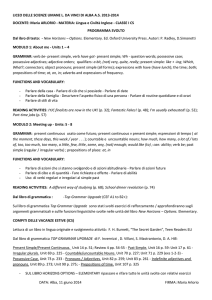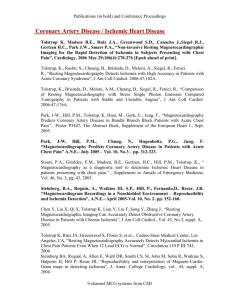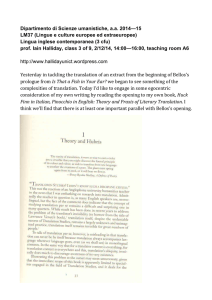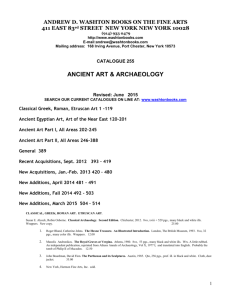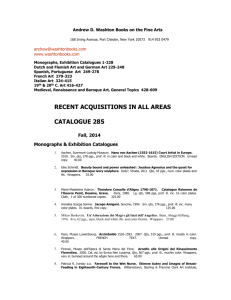Online560105106-105_syllabus_face_to_face
advertisement
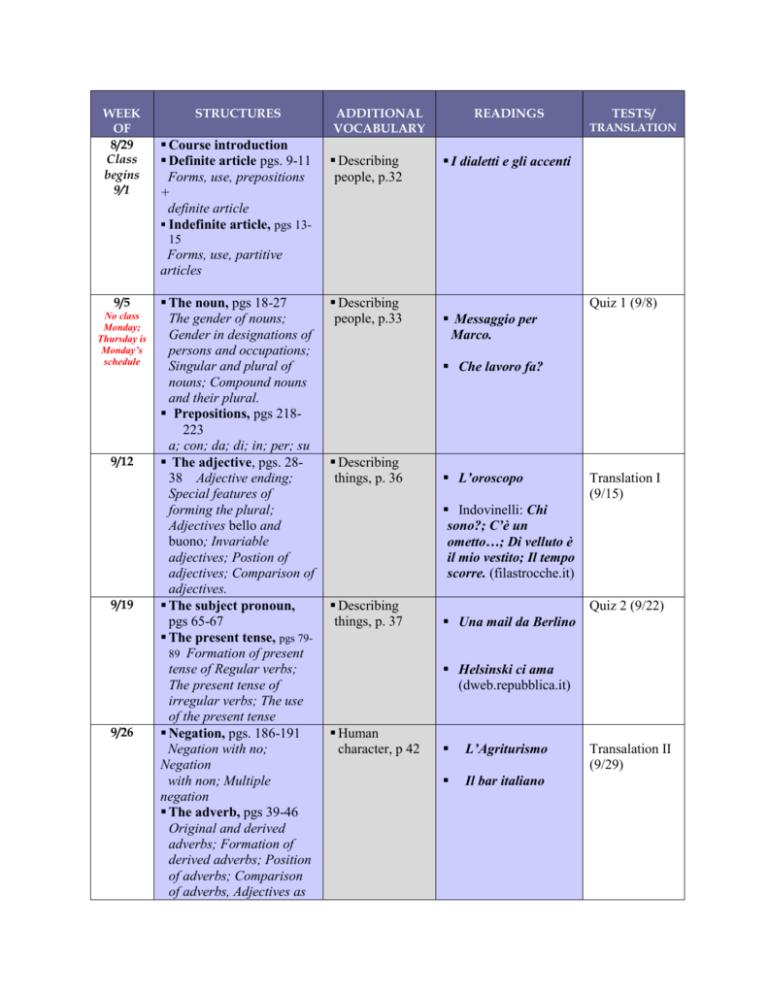
WEEK OF 8/29 Class begins 9/1 STRUCTURES Course introduction Definite article pgs. 9-11 Forms, use, prepositions + definite article Indefinite article, pgs 13- ADDITIONAL VOCABULARY Describing people, p.32 READINGS TESTS/ TRANSLATION I dialetti e gli accenti 15 Forms, use, partitive articles 9/5 No class Monday; Thursday is Monday’s schedule 9/12 9/19 9/26 The noun, pgs 18-27 The gender of nouns; Gender in designations of persons and occupations; Singular and plural of nouns; Compound nouns and their plural. Prepositions, pgs 218223 a; con; da; di; in; per; su The adjective, pgs. 2838 Adjective ending; Special features of forming the plural; Adjectives bello and buono; Invariable adjectives; Postion of adjectives; Comparison of adjectives. The subject pronoun, pgs 65-67 The present tense, pgs 7989 Formation of present tense of Regular verbs; The present tense of irregular verbs; The use of the present tense Negation, pgs. 186-191 Negation with no; Negation with non; Multiple negation The adverb, pgs 39-46 Original and derived adverbs; Formation of derived adverbs; Position of adverbs; Comparison of adverbs, Adjectives as Describing people, p.33 Quiz 1 (9/8) Messaggio per Marco. Che lavoro fa? Describing things, p. 36 L’oroscopo Translation I (9/15) Indovinelli: Chi sono?; C’è un ometto…; Di velluto è il mio vestito; Il tempo scorre. (filastrocche.it) Describing things, p. 37 Quiz 2 (9/22) Una mail da Berlino Helsinski ci ama (dweb.repubblica.it) Human character, p 42 L’Agriturismo Il bar italiano Transalation II (9/29) 10/3 adverbs. The present participle, pgs 174-177 Formation, Stare+ present participle; The present participle as a substitute for dependent clauses 10/10 The possessive pronoun, pgs 39-46 Use; Form; The possessive pronoun with kinship term; Special cases Conjunctions, pgs 231235 Coordinating conjunctions, Subordinating conjunctions. 10/17 10/24 10/31 11/7 Human character, p 43 Dialogo Cannavaro: “Cassano sta giocando…” Quiz 3 (10/6) (sampdorianews.net) Family and Friends, p. 52 Carissimo Dario Veglia di Giuseppe Ungaretti The present perfect, pgs 90-97 Formation of the present perfect; Formation of the past participle; Use of avere or essere to form the present perfect; Use of the present perfect. Family and Friends, p. 53 The imperfect, pgs 98104 Formation; Use; Present perfect or imperfect? Expressions of time, p 22-23 Il cinema italiano Tanti saluti da… Thursday no class an assignment will be posted on sakai. Translation III (10/17) MIDTERM EXAM (10/20) Numbers, pgs 224-230 The cardinal numbers; The date; Statements of Quantity; Time; The Ordinal numbers Demonstrative pronoun, pgs 54-57 Use; Form The object pronouns, Expressions of Expressions of quantity, pp 28-9 Un’intervista sull’infanzia (Natalia Ginzburg da Dacia Maraini) Amore mio infinito di Aldo Nove 44 gatti di G. Cesarini (filastrocche.it) Quiz 4 (10/27) Translation IV (11/3) Professione adolescente (donnamoderna.it) Quiz 5 (11/10) 11/14 11/21 Monday is Wednesday’s schedule; Tuesday is Thursday’s schedule 11/28 pgs. 67-72 Forms and use of the stressed object pronouns; Forms and use of the unstressed object pronouns; Position of the unstressed object pronouns; Italian verbs that require an object in a certain case. The pronominal adverbs ci and ne, pgs.72-74 Ci; Ne; the position of ci and ne The double pronouns, pgs 74-75 Possible combinations. The double pronouns, pgs 74-75 Possible combinations. (Continued) quantity, pp 289 The house, p 58 Review Caro Antonio Cinque fantastici (la7.it) Si fa presto dire ‘medicina alternativa’ (rolfing-italia.it) Ne parliamo a cena (ibs.it) The house, p 59 L’accento sull’A di G. Rodari Review Quiz 6 (11/22) “Così si ritrova tempo per se stesse” vademecum per donne che lavorano di Vera Schiavazzi vocab review Il marito ama il calcio, lei per vendetta gli manomette il decoder (notizie.tiscali.it) Padri e casalinghi, uomini a scuola di cucina e bucato di Vera Schiavazzi (larepubblica.it) 12/12 Transaltion V (11/17) Review Translation VI (12/1) 560:105 ITALIAN FOR READING KNOWLEDGE 105 is designed to develop the necessary skills needed to read and comprehend Italian prose. Students will develop comprehension of texts from a broader variety of disciplines including the humanities and the social sciences. At the end of the course students will be able to understand and interpret texts that present complex elements of Italian syntax, grammar, and vocabulary and will master basic translation skills. They will be able to identify the distinctive features of the language as well as the ways in which it shapes culturally specific meaning. Texts: Mastering Italian Grammar (Barron's Foreign Language Guides); Barron's Educational Series; Bilingual edition: 2007 Berlitz Italian Vocabulary Handbook, Berlitz Publishing, 2005 Course packet Italian-English/ English-Italian Dictionary Additional material will be posted on sakai Grade Distribution: Exams: Quizzes: Homework & Translations: Attendance & Participation: 30% 20% 30% 20% The grading scale is: 90-100=A; 86-89=B+; 80-85=B; 76-79=C+; 70-75=C; 60-69=D; below 60=F Attendance, Participation, and Disabilities Policies: Students are expected to attend all classes; if you expect to miss one or two classes, please use the University absence reporting website https://sims.rutgers.edu/ssra/ to indicate the date and reason for your absence. An email is automatically sent to me. All students must attend regularly. No more than three absences are allowed; use them wisely, for health and other serious issues. Having more than three absences, arriving to class late, and engaging in behavior that is distracting to the rest of the class are grounds for a significantly lower mark in class participation. In case students with disabilities should require any special type of assistance and would like to request accommodations, they must follow the procedures outlined at: http://disabilityservices.rutgers.edu/request.html Academic Integrity and Plagiarism In order to avoid plagiarism (the representation of the words or ideas of others as one’s own), every quotation must be indentified by quotation marks or appropriate indentation and must be properly cited in the text or in a footnote. Always acknowledge your sources clearly and completely when you paraphrase or summarize material from another source (in print, electronic, or other medium) on whole or in part. If you are in doubt, please consult the policy on plagiarism and academic integrity at Rutgers and do not hesitate to ask your instructor for clarifications. http://academicintegrity.rutgers.edu/integrity.shtml The use of on-line translators for homework and other assignments is forbidden. In order to succeed it is necessary to have the proper practice for tests and representing a translation that was not done by you is a breach of academic integrity. Daniele De Feo ddefeo@rci.rutgers.edu
